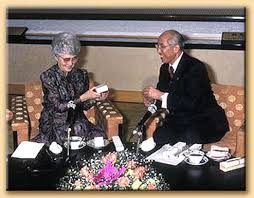
Apr 29, 2015 | Senza categoria
 «There is much talk here about the building of a common European home. We are convinced, however, that although this endeavour is very necessary, it will not be complete unless we think of it as a part of that “global village” that is now the Earth on which we live. This idea came to me also from the concern expressed in your letter about the precarious condition of our natural environment. (…) In fact, there are increasingly alarming analyses from scientists, politicians and international commissions about our ecosystem. People everywhere are launching proposals in an effort to heal our ailing world. (…) In the final analysis, ecology represents a challenge which can be met only by changing mentalities and forming consciences. It has already been demonstrated by very competent scientific studies that neither technical nor economic resources are lacking for the improvement of our environment. Instead, what is lacking is that spiritual supplement, that new love for the human person, which makes all of us feel responsible towards all the others in a common effort to manage the resources of the earth in an intelligent, just and balanced manner.(…) This question of a just distribution of goods in the world, of helping the poorer populations, of the solidarity of the north towards the south, of the rich towards the poor, is the other side of the ecological crisis. If the immense economic resources destined to boost the war industry and a super-production that requires more and more super-consumption, not to mention the waste of goods in the wealthy countries, if these enormous resources would serve, at least in part, to help the developing countries find their dignified way towards development, how much more breathable the atmosphere would be, how many forests would be spared, how many zones would not become desert wastelands, and how many human lives would be saved! (…) And yet, without a new awareness of universal solidarity, we will never take a step forward. (…) If human beings are not at peace with God, the earth itself is not at peace. Religious people are aware of the earth’s “suffering” when human beings do not use it according to the plan of God, but only for selfishness, for an insatiable desire to possess. This selfishness and desire contaminate the environment more and before any other kind of pollution, which is nothing other than its consequence. (…) Now the disastrous consequences force us to look at reality all together, in the perspective of a united world. If we don’t face this problem all together it will not be resolved. (…) If one discovers that all creation is a gift of a Father who loves us, it will be much easier to find a harmonious relationship with nature. And if one discovers also that this gift is for all members of the human family and not only for a few, more attention and respect will be given for something that belongs to the whole of humanity, present and future». Continue Reading
«There is much talk here about the building of a common European home. We are convinced, however, that although this endeavour is very necessary, it will not be complete unless we think of it as a part of that “global village” that is now the Earth on which we live. This idea came to me also from the concern expressed in your letter about the precarious condition of our natural environment. (…) In fact, there are increasingly alarming analyses from scientists, politicians and international commissions about our ecosystem. People everywhere are launching proposals in an effort to heal our ailing world. (…) In the final analysis, ecology represents a challenge which can be met only by changing mentalities and forming consciences. It has already been demonstrated by very competent scientific studies that neither technical nor economic resources are lacking for the improvement of our environment. Instead, what is lacking is that spiritual supplement, that new love for the human person, which makes all of us feel responsible towards all the others in a common effort to manage the resources of the earth in an intelligent, just and balanced manner.(…) This question of a just distribution of goods in the world, of helping the poorer populations, of the solidarity of the north towards the south, of the rich towards the poor, is the other side of the ecological crisis. If the immense economic resources destined to boost the war industry and a super-production that requires more and more super-consumption, not to mention the waste of goods in the wealthy countries, if these enormous resources would serve, at least in part, to help the developing countries find their dignified way towards development, how much more breathable the atmosphere would be, how many forests would be spared, how many zones would not become desert wastelands, and how many human lives would be saved! (…) And yet, without a new awareness of universal solidarity, we will never take a step forward. (…) If human beings are not at peace with God, the earth itself is not at peace. Religious people are aware of the earth’s “suffering” when human beings do not use it according to the plan of God, but only for selfishness, for an insatiable desire to possess. This selfishness and desire contaminate the environment more and before any other kind of pollution, which is nothing other than its consequence. (…) Now the disastrous consequences force us to look at reality all together, in the perspective of a united world. If we don’t face this problem all together it will not be resolved. (…) If one discovers that all creation is a gift of a Father who loves us, it will be much easier to find a harmonious relationship with nature. And if one discovers also that this gift is for all members of the human family and not only for a few, more attention and respect will be given for something that belongs to the whole of humanity, present and future». Continue Reading
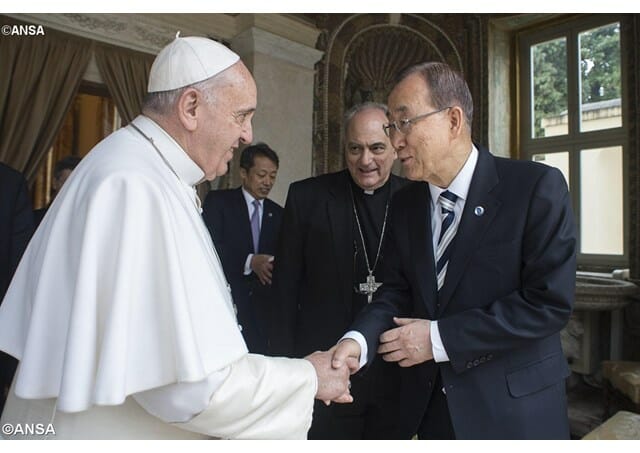
Apr 29, 2015 | Non categorizzato

No anticipating the encyclical of Pope Francis on the Creation, but great expectation for the document that will be published at the beginning of June. “The world waits to hear his teaching and what he will say in the encyclical and in his speech before the United Nations Assembly on September 25, 2015,” said Jeffrey Sachs, director of the UN agency for sustainable development (UN Sustainable Development Solutions Networks). He is also one of the promoters of the summit, along with the Pontifical Academy of the Sciences and the Religions for Peace, which has Maria Voce as one of its co-presidents. Also in attendance: were General Secretary of the United Nations Ban Ki-Moon, president of the Italian Republic Sergio Mattarella, and president of the Republic of Equador Rafael Vicente Correa.

The conference brings together scientists, environmentalists, Nobel laureates, political and religious leaders to further the discussion on climate change and sustainable development in view of the encyclical on Creation. The day focused on the moral dimensions of the commitment to sustainable development. This is why the involvement of a wide diversity of religious communities seemed quite an encouraging novelty. For Maria Voce, what emerges from this summit is a “new awareness that, in order to obtain something positive, we must come together, because no one, by himself, has the recipe for getting out of these quite dramatic situations.
It reveals that the human race has within itself the ability to get out of the crisis, but it can be done if there is a synergy of all the components. What is emerging is the need for listening to each other, and acting together.”

Cardinal Turkson, president of the Pontifical Council for Justice and Peace proposed that the answers should not be merely technical, but should be based on the moral dimension and oriented towards the well-being of humankind. Technological, scientific and economic progress has introduced lifestyles that were unimaginable to our predecessors, but it also has “some dark sides and unacceptable costs.” “While global society is defined on the values of consumption and economic factors, the rich of today have grown numb in front of the cry of the poor.” “Out of the 7 billion people living the world, 3 billion are living in conditions of poverty, as an elite consumes the greatest portion of the resources.” The discussion ended on the topic of food, which will be at the centre of the Universal Expo 2015 in Milan, Italy. Turkson strongly denounced the exploitation of workers, the trafficking of human beings and the modern forms of slavery. Pope Francis deplores this “throw-away culture,” the Cardinal recalled, in the “globalisation of indifference.” “The Church is not an expert in science, technology or economy, but it is an expert in humanity. To win the challenge of sustainable development “the same conversion, personal transformation and renewal are needed that were invoked fifty years ago by Paul VI and encouraged by Pope Francis today.
“One concrete possibility is offered by a project inspired by the Eco One Project,” Maria Voce remarked during an interview. “It’s the Earth Cube. Its six sides have catchy phrases that can get us involved in supporting a healthy and sustainable planet: ‘Smile on the world!’ ‘Discover the beauty!’ It also teaches sobriety, taking only what you need as the trees do. It suggest daily actions, concrete gestures: ‘Don’t waste water.’ ‘Recycle!’ The last side says: “Now is the time!” Don’t wait until tommorrow. Simple projects such as these can help us to do what the Pope is inviting us to do.”
Apr 29, 2015 | Non categorizzato, Word of
With the tenderness of mercy our love can give witness to the reality of God’s love. We experience what we share with others. When the Lord God appeared to Moses on Mount Sinai he declared his identity as: ‘The Lord, a God merciful and gracious, slow to anger, and abounding in steadfast love and faithfulness’ (Ex 34:6). To indicate the nature of this merciful love, the Hebrew Bible uses a word (raḥămîm) that recalls a mother’s womb, the place where life begins. By making himself known as ‘merciful’, God shows that for each thing he has made he is concerned as a mother is for her child. He cares, is near, protects, looks after his creature. The Bible uses a further term (ḥesed) to express other aspects of this love which is mercy: faithfulness, benevolence, goodness, solidarity. Mary in her Magnificat too sings of the Almighty’s mercy that is from generation to generation (see Lk 1:50). Jesus himself spoke to us of God’s love, revealing him as a ‘Father’ close and attentive to our every necessity, keen to pardon, to give all we need: ‘he makes his sun rise on the evil and on the good, and sends rain on the righteous and on the unrighteous’ (Mt 5:45). His love is truly ‘rich’ and ‘great’, as is said in the letter to the Ephesians that give us our Word of Life: ‘But God, who is rich in mercy, out of the great love with which he loved us even when we were dead through our trespasses, made us alive together with Christ.’ What Paul says here is almost a cry of joy born of the contemplation of the extraordinary thing God has done for us. We were dead and he revived us, giving us a new life. The words begin with ‘but’, indicating a contrast with what Paul pointed out earlier. This was the tragic condition of humanity crushed beneath its wrongdoing and sins, prisoner of selfish and wicked desires, under the influence of the powers of evil, in open rebellion against God. In this situation it would have deserved God’s wrath (see Eph 2:1-3). In contrast God, instead of punishing – hence Paul’s utter amazement – gives humanity life again. God does not let himself be governed by wrath, but by mercy and by love. Jesus had already suggested that God acts like this when he told the parable of the Prodigal Son, the younger brother who was welcomed back by his father with open arms after he had sunk into an inhuman life. It was the same with the parable of the Good Shepherd who goes in search for the lost sheep and puts it on his shoulders to bring it back home. And the same can be seen in the Good Samaritan who cares for the wounds of the man who had fallen into the hands of robbers (see Lk 15:11-32; 3-7; 10:30-37). God, a merciful father, symbolized in the parables, has not only forgiven us, but he has given us life itself in his son Jesus, that is, given us the fullness of divine life. And this leads to a hymn of gratitude: ‘But God, who is rich in mercy, out of the great love with which he loved us even when we were dead through our trespasses, made us alive together with Christ.’ This Word of Life ought to make us feel the same joy and gratitude as Paul and the first Christian community. To each one of us, too, God shows himself ‘rich in mercy’ and of ‘great love’, ready to forgive and grant trust again. There is no situation of sin, of suffering, of solitude, where he does not make himself present, does not come alongside us to go with us on our way, does not grant us trust, the possibility of rising up and the strength to start again. At his first ‘Angelus’, on 17 March two years ago, Pope Francis started speaking about the mercy of God, a theme that has become characteristic for him. At that time he said, ‘God’s face is the face of a merciful father who is always patient… he understands us, he waits for us, he does not tire of forgiving us.’ He ended that first brief greeting with the words, ‘He is the loving Father who always pardons, who has that heart of mercy for us all. And let us too learn to be merciful to everyone.’ This points to a practical way to live the Word of Life. If God for us is rich in mercy and of great love, we too are called to be merciful towards others. If he loves those who are bad, who are his enemies, we too ought to learn how to love those who are not ‘lovable’, even our enemies. Did not Jesus tell us, ‘Blessed are the merciful, for they will receive mercy’ (Mt 5:7)? Did he not ask us to be ‘merciful, just as your Father is merciful’ (Lk 6:36)? Paul too invites his communities, chosen and loved by God, to clothe themselves ‘with compassion, kindness, humility, meekness, and patience’ (Col 3:12). If we have believed in God’s love, we too can love in our turn with that love which makes us draw close to every situation of pain and need, that forgives all things, that protects, that knows how to look after the other person. Living in this way we will be able to give witness to God’s love and help those we meet discover that also for them God is rich in mercy and of great love. Fabio Ciardi
![PRESET Eco-sustainability Project in Argentina]()
Apr 28, 2015 | Focolare Worldwide
 Forty-two professionals of eight different countries in Europe and Latin America accepted the invitation. The event which was held in the Focolare’s Lia town at the outskirts of Buenos Aires, not only hosted the seminar (9-21 March) financed by the European Union, but was also subjected to the study for the creation of a sustainable management and development model of a sustainable place to live in. To coincide with these times when we feel the urgency of questioning ourselves on the environment and promoting the quest for new technologies – with the planet’s survival at stake – the initiative was joined by the group, “Dialogue in Architecture,” a network of scholars and experts of the sector, inspired by the spirituality of the Focolare, given the actuality of the theme.
Forty-two professionals of eight different countries in Europe and Latin America accepted the invitation. The event which was held in the Focolare’s Lia town at the outskirts of Buenos Aires, not only hosted the seminar (9-21 March) financed by the European Union, but was also subjected to the study for the creation of a sustainable management and development model of a sustainable place to live in. To coincide with these times when we feel the urgency of questioning ourselves on the environment and promoting the quest for new technologies – with the planet’s survival at stake – the initiative was joined by the group, “Dialogue in Architecture,” a network of scholars and experts of the sector, inspired by the spirituality of the Focolare, given the actuality of the theme.
By immersing themselves in the discovery of the territory and its structures, the youth started by studying the PRESET (“Participation, Resilience and Employability through Sustainability, Entrepreneurship and Training”), a study project promoted by the association Starkmacher – on the sustainability of the towns of the Focolare – and other partners such as the Fazenda da Esperança (Brazil), Fundación Unisol (Bolivia), New Humanity ((an NGO with Special Consultative Status within the Economic & Social Council of the United Nations) and Economy for tomorrow (Slovenia), and to work specifically on an integral eco-sustainable proposal for the town of Lia.
The youth participated in five thematic workshops guided by the value of fraternity as a lifestyle, and reached an integral eco-sustainable proposal (Ecocity Mariapolis) in which they involved all the inhabitants of the town, and also the youth of the district who attended for an afternoon to recount and speak of the environment.
 The EcoCity Mariapolis that will implement the proposal while respecting the history of the town and carrying out concrete dialogues with its inhabitants, created during the seminar, a biogas system for one of the houses of the town, and explained the procedure to make compost, a study for the installation of a photovoltaic system, for the insulation of the constructions in order to save energy and for the replacement of bulbs with Led lights and many more. This seemed to be a step by step growth in the education on the environment. A set of didactic handouts will be prepared for the inhabitants and the visitors of the Mariapolis, to be diffused also in schools through the Web.
The EcoCity Mariapolis that will implement the proposal while respecting the history of the town and carrying out concrete dialogues with its inhabitants, created during the seminar, a biogas system for one of the houses of the town, and explained the procedure to make compost, a study for the installation of a photovoltaic system, for the insulation of the constructions in order to save energy and for the replacement of bulbs with Led lights and many more. This seemed to be a step by step growth in the education on the environment. A set of didactic handouts will be prepared for the inhabitants and the visitors of the Mariapolis, to be diffused also in schools through the Web.
Also art was utilised for the efficacy of the proposal through the creation of a line of products (hair, hats, etc.) decorated with ethnic motifs and produced with ecologic material, and with a theatre performance connected to the theme.
A pleasant coincidence in those days was that the Dean of Sophia University Institute of Loppiano, Prof. Piero Coda, happened to be visiting the town and said: «I think this is not just a coincidence. Perhaps it is God’s design that is leading to something new, and creating a network of communion, work for solidarity and justice.»
Francesco from Udine gave a significant testimonial: «I work as an architect and am doing a Master’s in almost zero energy buildings. What I found most interesting in this workshop is the fact that people with diverse potentials and specializations are working together, and not only architects like us. I think this is the most enriching part for everyone: starting off with different potentials to reach a common objective which is that of sustainability, not only from the environmental but also from the economic and social points of view.»
Likewise Riccardo, an Italian architect, is convinced of the importance of working together: «I firmly believe that what I can do is but a small part, while together we could reach the objectives that will allow the entire society to exploit the resources well, and create satisfactory wellbeing for everyone including professionals. »
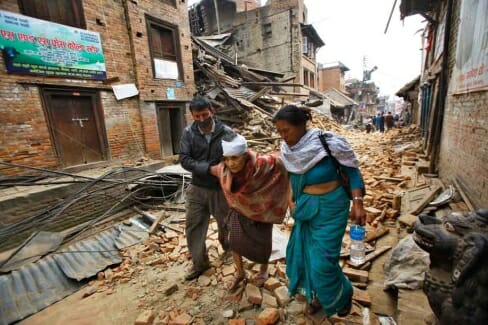
Apr 27, 2015 | Focolare Worldwide
 Some of our Nepalese friends wrote:«The situation is really bad. I myself am alive, but we have lived without a roof above our heads for days and nights. Many have died and others are dying, and many are wounded. Besides the rising number of victims according to the UNICEF estimates, 940 thousand children are at risk, and urgently need healthcare. The Focolare Movement joins the prayers for the people struck, their families, in their requests for consolation in this immense tragedy, and is making the move to gather funds. From Mumbai, where the youth of the Focolare have gathered to prepare for the United World Week – and among which there are three from Nepal – the group has launched an appeal to the Youth for a United World worldwide, to start up a support action for all the people struck by the calamity: «The United World Week – they wrote – may be an immediate occasion to concretely express our support.» Pope Francis, after praying during the Angelus for the victims of the earthquake, urging all to “give their fraternal support,” expressed in a message sent to the Apostolic Nunzio in Nepal, his own personal prayer and support for the Nepalese population. Caritas Nepal, in the meantime, has started up an action plan to face the emergency, but it needs a lot of backup. Tents and food are being distributed: the main problem at the moment is to offer a refuge, to protect the people from the cold and the rain.
Some of our Nepalese friends wrote:«The situation is really bad. I myself am alive, but we have lived without a roof above our heads for days and nights. Many have died and others are dying, and many are wounded. Besides the rising number of victims according to the UNICEF estimates, 940 thousand children are at risk, and urgently need healthcare. The Focolare Movement joins the prayers for the people struck, their families, in their requests for consolation in this immense tragedy, and is making the move to gather funds. From Mumbai, where the youth of the Focolare have gathered to prepare for the United World Week – and among which there are three from Nepal – the group has launched an appeal to the Youth for a United World worldwide, to start up a support action for all the people struck by the calamity: «The United World Week – they wrote – may be an immediate occasion to concretely express our support.» Pope Francis, after praying during the Angelus for the victims of the earthquake, urging all to “give their fraternal support,” expressed in a message sent to the Apostolic Nunzio in Nepal, his own personal prayer and support for the Nepalese population. Caritas Nepal, in the meantime, has started up an action plan to face the emergency, but it needs a lot of backup. Tents and food are being distributed: the main problem at the moment is to offer a refuge, to protect the people from the cold and the rain.
Funds can be deposited directly in the Youth for a United World special bank account: SAVINGS ACCOUNT OF THE CENTRAL SECRETARIAT OF THE YOUTH FOR A UNITED WORLD (GMU) Description: EMERGENCY NEPAL ACCOUNT NAME: PIA ASSOCIAZIONE MASCHILE OPERA DI MARIA Via Frascati 306, Rocca di Papa, 00040 Rome, Italy BANK NAME: BANCA PROSSIMA Piazza Paolo Ferrari 10 20121 Milan Italy IBAN CODE FOR NATIONAL AND INTERNATIONAL TRANSFERS: IBAN IT62 W033 5901 6001 0000 0113 348 BIC BCITITMX
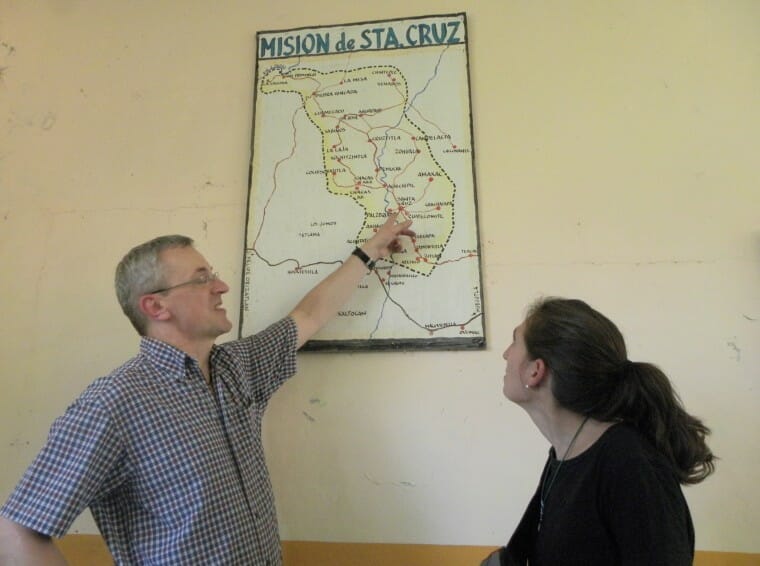
Apr 27, 2015 | Focolare Worldwide
 First time visitors to Santa Cruz de la Sierra are met by an unexpected scene: the exuberant and inviting natural environment, an unfamiliar language, the quite diverse local culture, the poverty, simplicity and endless generosity of the people.
First time visitors to Santa Cruz de la Sierra are met by an unexpected scene: the exuberant and inviting natural environment, an unfamiliar language, the quite diverse local culture, the poverty, simplicity and endless generosity of the people.
One group of young people and families from the Focolare decided to spend Holy Week in Santa Cruz with their friends from the Nahua. Due to the great pastoral need, the local Church gave permission to certain prepared laypeople to act as extraordinary ministers at the discretion of the pastors. They share what happened:
“The sun has just appeared over the horizon and the bus clambers along the mountain roads of east Sierra Madre, carrying 43 young people and families from the Focolare. The journey promises to be long and exciting; the tiredness goes unnoticed because of the great joy. At the road’s end there are brothers and sisters from 33 families of the Nahuas community ready to celebrate Holy Week with us.
Eight hours away from the City of Mexico we are welcomed into Santa Cruz by a generous and humble folk living in the heart of the huasteca hidalgeuense (unfading flower): a humid region with high temperatures, covered with cedar, ebony and mahogany wood trees.
At one of the mission parishes we split up into seven groups and go out to be with the people, to help with the liturgical services in seven communities where the seed of the spirituality of the Focolare has been growing for several years.
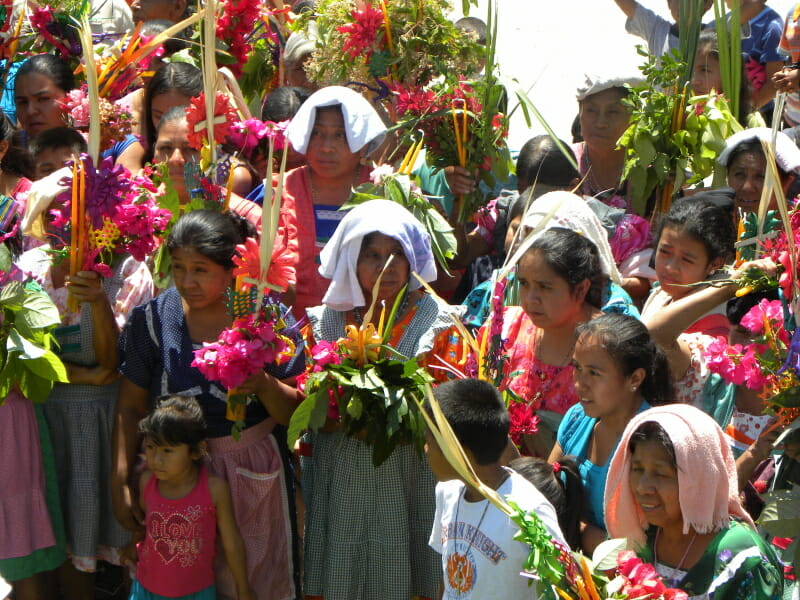 The encounter is overwhelming as the life, faith and bread begin to be shared. Several testimonies of Gospel life are shared, as well as small gift items. After the celebration of the washing of the feet, one of the young people exclaims: “It’s so fantastic to feel like a Christian!” One teenager said she had attended many missions, but “with Jesus among us it’s different; indeed, He’s the one who draws people and that’s why we wanted to attend the meetings and the liturgical celebrations.”
The encounter is overwhelming as the life, faith and bread begin to be shared. Several testimonies of Gospel life are shared, as well as small gift items. After the celebration of the washing of the feet, one of the young people exclaims: “It’s so fantastic to feel like a Christian!” One teenager said she had attended many missions, but “with Jesus among us it’s different; indeed, He’s the one who draws people and that’s why we wanted to attend the meetings and the liturgical celebrations.”
Amongst the many personal encounters, one particularly touched us: We visit an alone and elderly man, who has been immobile for a long time. The state of his hygiene is extremely poor. We bathe him and clean his tiny room; help him to prepare for receiving Jesus in the Eucharist, and give him Holy Communion. The next day, he dies.
Following a Holy Week of intense living and after having experienced mutual giving and receiving in simplicity and generosity, the moment arrives when we must return to Mexico City. During the return trip, many of us remember the words spoken by Chiara Lubich in the Basilica of Guadalupe in 1997: “Inculturation requires an exchange of gifts.”
Seeing the enthusiasm of the young misioneros and the members of the communities we visited, there is new hope that the Misión in Santa Cruz will not remain an isolated event, but the sign of a new beginning of a process of increased giving by the Focolare in Mexico.”
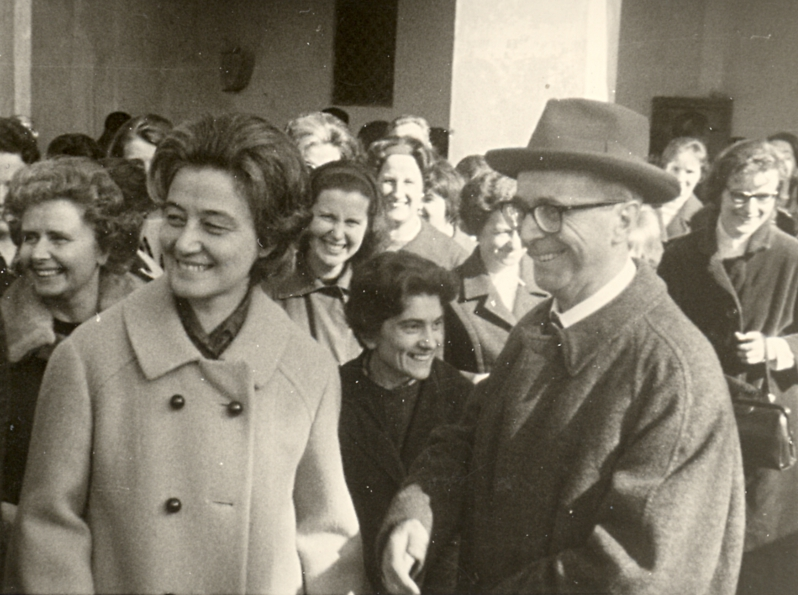
Apr 26, 2015 | Non categorizzato
 “This event, like all things of God, began from a humble seed. Silvia Lubich was the daughter of a wine merchant who the economic crisis of the Second World War had reduced to being a modest city worker. He was the husband of a housewife from Trent who, as a young woman, had worked in the print shop of Cesare Battisti. They were a Catholic couple like many others from Trent: simple and direct, without a lot of pretensions. They brought four children into the world, a boy, the firstborn, and three girls. The eldest daughter, Silvia, was born on January 22, 1920. They raised them all in the Catholic faith which since her infancy had shaped Silvia in a straightforward piety. It was straightforward in the sense that it did not allow any compromises: it didn’t allow her to divide her desire between God and the world; to think about good and evil; to show one thing while hiding another. There was God, and God was everything: so one had to belong totally to Him; to do His will like a ray of sun that leaped down from heaven to rest upon earth.” So begins the Story of Light, the story of Chiara Lubich written by one of the main protagonists of the events it describes: Igino Giordani, an eminent figure in Italian politics and culture, and also co-founder of the Focolare Movement. “It is never easy for a work to become a masterpiece,” Director of the Igino Giordani Centre, Alberto Lo Presti writes in the introduction to the first installment. “What then of a book that would contend for this position with a hundred other books written by Giordani? But Story of Light never saw the light. Not only that: it remained unknown even to those who have preserved it over the years. Giordani himself had asked them to wait – whereas most authors would have preferred the opposite; that is, to be recognized especially for their best works.” “Story of Light is not based on historiographic research. It could be described as a recounting of the miraculous intervention brought about by the Holy Spirit – visible in the person and actions of Chiara Lubich – in twentieth century history. In other words, it is comprised of a series of narrative portraits in which Chiara’s biographical sketch is intertwined with God’s plan for humankind, whose ideals had been afflicted and social systems divided and devastated by world wars. This is why, in the subtle interweaving of events in Story of Light, we recognize some of the basic elements in Giordani’s own complex personality. He experienced first-hand all the main dramatic events of the twentieth century, having been wounded in the war, having undergone exclusion because of his ideas, and having had to accept exclusion from civil society. He was a man of faith who worked both in Church and culture, aware that the radical evil would be defeated by a new Christian spirit that he set out to discover. He met Chiara Lubich in September 1948 and found in her the light he had been looking for. He followed her, placing at the disposal of the Focolare founder all of his intelligence and will. He never had doubts about the strength and pre-eminence of the figure of Chiara for the Church, society, current history, and the future. Therefore, even had he have wanted to, Giordani could never have written a complete, objective, methodologically flawless story of Chiara Lubich. His human and spiritual involvement could not allow him that.” “The author had written many volumes on great spiritual figures: Catherine of Siena, Ignatius of Loyola, Magdalene of Canossa, Contardo Ferrini, Francis of Paola, Vincent de Paul, Francis de Sales, Francis of Assisi, to mention a few of his works. They formed a gallery of extraordinary people from diverse times and backgrounds. The place of honor in this rich array was assigned to Chiara Lubich, whose story Giordani called his “masterpiece.” At the age of fifty four when history called him to meet Chiara, he did not enter into the relationship without a spiritual preparation. He knew how to measure the religious greatness of an ideal, just as he had the tools for testing the spiritual size and strength of a mystical intuition. For this reason . . .it is likely that Giordani felt a paramount duty of attesting to who Chiara really was. Moreover, he took on this particular role from the first moments of his visits with Chiara and the first small group of focolarine. With his learning, he was well able to reveal the importance and newness of the figure of Chiara to the young men and women who were her followers.” “Giordani lived through difficult moments during which Chiara Lubich and the Focolare were under the magnifying glass of the Congregation of the Holy Office. From that period – the 1950s – and for many years to come, a widespread attitude of prudent discretion was maintained around the figure of Chiara. It may have been necessary to hold back any sentiments of esteem and affection for Chiara, but for Giordani there was never any doubt that the truth about her had to be put in writing and handed on. Hence, Story of Light, his masterpiece.” Introduction to Story of Light (complete text) – Published by Nuova Umanità, gennaio-marzo 2015
“This event, like all things of God, began from a humble seed. Silvia Lubich was the daughter of a wine merchant who the economic crisis of the Second World War had reduced to being a modest city worker. He was the husband of a housewife from Trent who, as a young woman, had worked in the print shop of Cesare Battisti. They were a Catholic couple like many others from Trent: simple and direct, without a lot of pretensions. They brought four children into the world, a boy, the firstborn, and three girls. The eldest daughter, Silvia, was born on January 22, 1920. They raised them all in the Catholic faith which since her infancy had shaped Silvia in a straightforward piety. It was straightforward in the sense that it did not allow any compromises: it didn’t allow her to divide her desire between God and the world; to think about good and evil; to show one thing while hiding another. There was God, and God was everything: so one had to belong totally to Him; to do His will like a ray of sun that leaped down from heaven to rest upon earth.” So begins the Story of Light, the story of Chiara Lubich written by one of the main protagonists of the events it describes: Igino Giordani, an eminent figure in Italian politics and culture, and also co-founder of the Focolare Movement. “It is never easy for a work to become a masterpiece,” Director of the Igino Giordani Centre, Alberto Lo Presti writes in the introduction to the first installment. “What then of a book that would contend for this position with a hundred other books written by Giordani? But Story of Light never saw the light. Not only that: it remained unknown even to those who have preserved it over the years. Giordani himself had asked them to wait – whereas most authors would have preferred the opposite; that is, to be recognized especially for their best works.” “Story of Light is not based on historiographic research. It could be described as a recounting of the miraculous intervention brought about by the Holy Spirit – visible in the person and actions of Chiara Lubich – in twentieth century history. In other words, it is comprised of a series of narrative portraits in which Chiara’s biographical sketch is intertwined with God’s plan for humankind, whose ideals had been afflicted and social systems divided and devastated by world wars. This is why, in the subtle interweaving of events in Story of Light, we recognize some of the basic elements in Giordani’s own complex personality. He experienced first-hand all the main dramatic events of the twentieth century, having been wounded in the war, having undergone exclusion because of his ideas, and having had to accept exclusion from civil society. He was a man of faith who worked both in Church and culture, aware that the radical evil would be defeated by a new Christian spirit that he set out to discover. He met Chiara Lubich in September 1948 and found in her the light he had been looking for. He followed her, placing at the disposal of the Focolare founder all of his intelligence and will. He never had doubts about the strength and pre-eminence of the figure of Chiara for the Church, society, current history, and the future. Therefore, even had he have wanted to, Giordani could never have written a complete, objective, methodologically flawless story of Chiara Lubich. His human and spiritual involvement could not allow him that.” “The author had written many volumes on great spiritual figures: Catherine of Siena, Ignatius of Loyola, Magdalene of Canossa, Contardo Ferrini, Francis of Paola, Vincent de Paul, Francis de Sales, Francis of Assisi, to mention a few of his works. They formed a gallery of extraordinary people from diverse times and backgrounds. The place of honor in this rich array was assigned to Chiara Lubich, whose story Giordani called his “masterpiece.” At the age of fifty four when history called him to meet Chiara, he did not enter into the relationship without a spiritual preparation. He knew how to measure the religious greatness of an ideal, just as he had the tools for testing the spiritual size and strength of a mystical intuition. For this reason . . .it is likely that Giordani felt a paramount duty of attesting to who Chiara really was. Moreover, he took on this particular role from the first moments of his visits with Chiara and the first small group of focolarine. With his learning, he was well able to reveal the importance and newness of the figure of Chiara to the young men and women who were her followers.” “Giordani lived through difficult moments during which Chiara Lubich and the Focolare were under the magnifying glass of the Congregation of the Holy Office. From that period – the 1950s – and for many years to come, a widespread attitude of prudent discretion was maintained around the figure of Chiara. It may have been necessary to hold back any sentiments of esteem and affection for Chiara, but for Giordani there was never any doubt that the truth about her had to be put in writing and handed on. Hence, Story of Light, his masterpiece.” Introduction to Story of Light (complete text) – Published by Nuova Umanità, gennaio-marzo 2015
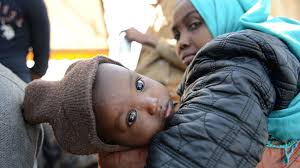
Apr 25, 2015 | Non categorizzato

Photo: Francesco Pecoraro/AP
![PRESET Eco-sustainability Project in Argentina]()
Apr 24, 2015 | Focolare Worldwide

Photo credit: WFP/Abeer Etefa
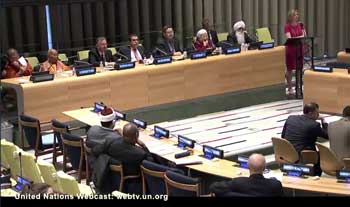
Apr 23, 2015 | Focolare Worldwide
Video of High-Level Thematic Debate
What are the religions in today’s world? Many see them as obstacles to peace, the residue of ages past that today are the cause of violent extremism. What would the world really be more peaceful without the religions? The High-Level Thematic Debate on Promoting Tolerance and Reconciliation suddenly became animated. The second day of the UN meeting offered some directives. During the opening address, Secretary General Ban Ki-moon proposed an advisory committee formed by the leaders of the world’s religions, to help the United Nations find solutions to the current conflicts, often between the followers of different religions. The plenary session that followed included testimonies from 15 religious leaders. All present agreed that religions should help to build peace, moving beyond mere tolerance to mutual acceptance, with the awareness that there are already people around the world who are already living like this in their daily lives. In her talk, Maria Voce recalled the long experience lived by the Focolare Movement: “The encounter between religions and cultures is an ongoing and fruitful experience that is not limited to tolerance, mere recognition of differences, and it goes beyond reconciliation, although that is fundamental, and it creates what could be called a new broader and shared common identity.” And this takes place in contexts that have been struck by serious crises, such as in Algeria, Syria, Iraq, Lebanon, the Democratic Republic of the Congo, Nigeria and the Philippines. 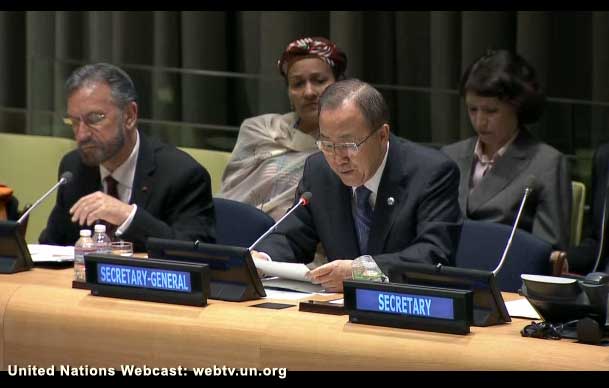 In response to the challenges and to the violence, she proposed an “extremism in dialogue,” that is, a dialogue requiring maximum engagement “that is risky, demanding, challenging, that aims at severing the roots of misunderstanding, fear and resentment.” Then she invited all to aim for a “a universal civilization that leads all peoples to consider themselves part of “civilization of alliance; a universal civilization which enables peoples to see themselves as part of a great happening, which is both varied and fascinating, that is humankind’s journey towards unity. She invited the UN to rethink its own calling, to reformulate its mission in order to be “an institution which truly works towards unity among nations, while respecting their strong identities.” According to Maria Voce, to say that religions are the cause of the tensions is to have a too restricted vision of the situation. What we are witnessing in many areas of the world, from the Middle East to Africa, has very little to do with religion, but has much to do with the structures marked by the culture war. From any point of view, in these cases we should not speak so much about wars of religion but more concretely, realistically and prosaically, about the religion of war. Everyone was in agreement: religions lead to peace, if not, they are instrumentalised for other ends. And so the vocation of religions is clearly stated: The Golden Rule, the foundational inspiration of all religions, which unites them, the idea of one universal human family.
In response to the challenges and to the violence, she proposed an “extremism in dialogue,” that is, a dialogue requiring maximum engagement “that is risky, demanding, challenging, that aims at severing the roots of misunderstanding, fear and resentment.” Then she invited all to aim for a “a universal civilization that leads all peoples to consider themselves part of “civilization of alliance; a universal civilization which enables peoples to see themselves as part of a great happening, which is both varied and fascinating, that is humankind’s journey towards unity. She invited the UN to rethink its own calling, to reformulate its mission in order to be “an institution which truly works towards unity among nations, while respecting their strong identities.” According to Maria Voce, to say that religions are the cause of the tensions is to have a too restricted vision of the situation. What we are witnessing in many areas of the world, from the Middle East to Africa, has very little to do with religion, but has much to do with the structures marked by the culture war. From any point of view, in these cases we should not speak so much about wars of religion but more concretely, realistically and prosaically, about the religion of war. Everyone was in agreement: religions lead to peace, if not, they are instrumentalised for other ends. And so the vocation of religions is clearly stated: The Golden Rule, the foundational inspiration of all religions, which unites them, the idea of one universal human family.  In the roundtable at the afternoon plenary, which was moderated by BBC’s, Laura Trevelyan, Rabbi David Rosen asked why so many young people feel drawn to extremism: “Perhaps because they are searching for their own identity, or for some meaning in life.” “You normally do not mention God at the United Nations,” Rabbi Arthur Schneier dared to remark: “How are we to deal with this problem – that the UN has to be neutral – when 5 of the 7 billion people on this earth belong to a religion?” For Bhai Sahib Mohinder Singh, Sikh from Birmingham: “God is omnipresent, in each one of us, therefore you cannot say that God is not here.” Maria Voce: “You speak of God when you speak of justice, sharing all the goods of the earth, sustainable development; you speak of God when you think of what we are preparing for the future generations. This is speaking of God. It is not necessary to speak of him in the abstract.” How can we preserve the integrity of interreligious dialogue? Are the religious leaders here renouncing something by coming here to the UN to talk about resolving conflicts? “I’m not renouncing anything,” affirmed Maria Voce. “I’ve come out of love, thinking about bringing my contribution of love to humanity. I’ve felt enriched by this possibility.” She concluded with a glance towards the new generations: “Returning home, what I will do will be to support the activities of the young and the very young, because I believe in their prophetic power.” Then she gave the floor to Ermanno Perotti, a young Italian had accompanied her on her visit to the United States. The twenty five year-old, with a Master’s Degree in Development Economics, used the occasion to present the l’Atlas of Universal Fraternity, a dossier of projects that promote universal fraternity in all corners of the world. Maria Voce added: “With the hope that one day even these ‘fragments of fraternity’ can be presented to the United Nations,” and that the United Nations will gather them. With this vision it becomes clear that religions have a great opportunity, but also a great task: to build peace and respond to the challenges with “extreme dialogue” rather than closing in on their own group. Susanne Janssen, New York
In the roundtable at the afternoon plenary, which was moderated by BBC’s, Laura Trevelyan, Rabbi David Rosen asked why so many young people feel drawn to extremism: “Perhaps because they are searching for their own identity, or for some meaning in life.” “You normally do not mention God at the United Nations,” Rabbi Arthur Schneier dared to remark: “How are we to deal with this problem – that the UN has to be neutral – when 5 of the 7 billion people on this earth belong to a religion?” For Bhai Sahib Mohinder Singh, Sikh from Birmingham: “God is omnipresent, in each one of us, therefore you cannot say that God is not here.” Maria Voce: “You speak of God when you speak of justice, sharing all the goods of the earth, sustainable development; you speak of God when you think of what we are preparing for the future generations. This is speaking of God. It is not necessary to speak of him in the abstract.” How can we preserve the integrity of interreligious dialogue? Are the religious leaders here renouncing something by coming here to the UN to talk about resolving conflicts? “I’m not renouncing anything,” affirmed Maria Voce. “I’ve come out of love, thinking about bringing my contribution of love to humanity. I’ve felt enriched by this possibility.” She concluded with a glance towards the new generations: “Returning home, what I will do will be to support the activities of the young and the very young, because I believe in their prophetic power.” Then she gave the floor to Ermanno Perotti, a young Italian had accompanied her on her visit to the United States. The twenty five year-old, with a Master’s Degree in Development Economics, used the occasion to present the l’Atlas of Universal Fraternity, a dossier of projects that promote universal fraternity in all corners of the world. Maria Voce added: “With the hope that one day even these ‘fragments of fraternity’ can be presented to the United Nations,” and that the United Nations will gather them. With this vision it becomes clear that religions have a great opportunity, but also a great task: to build peace and respond to the challenges with “extreme dialogue” rather than closing in on their own group. Susanne Janssen, New York
Video of Round Table Debate: http://webtv.un.org/high-level-thematic-debate Press Release Press Area

 «There is much talk here about the building of a common European home. We are convinced, however, that although this endeavour is very necessary, it will not be complete unless we think of it as a part of that “global village” that is now the Earth on which we live. This idea came to me also from the concern expressed in your letter about the precarious condition of our natural environment. (…) In fact, there are increasingly alarming analyses from scientists, politicians and international commissions about our ecosystem. People everywhere are launching proposals in an effort to heal our ailing world. (…) In the final analysis, ecology represents a challenge which can be met only by changing mentalities and forming consciences. It has already been demonstrated by very competent scientific studies that neither technical nor economic resources are lacking for the improvement of our environment. Instead, what is lacking is that spiritual supplement, that new love for the human person, which makes all of us feel responsible towards all the others in a common effort to manage the resources of the earth in an intelligent, just and balanced manner.(…) This question of a just distribution of goods in the world, of helping the poorer populations, of the solidarity of the north towards the south, of the rich towards the poor, is the other side of the ecological crisis. If the immense economic resources destined to boost the war industry and a super-production that requires more and more super-consumption, not to mention the waste of goods in the wealthy countries, if these enormous resources would serve, at least in part, to help the developing countries find their dignified way towards development, how much more breathable the atmosphere would be, how many forests would be spared, how many zones would not become desert wastelands, and how many human lives would be saved! (…) And yet, without a new awareness of universal solidarity, we will never take a step forward. (…) If human beings are not at peace with God, the earth itself is not at peace. Religious people are aware of the earth’s “suffering” when human beings do not use it according to the plan of God, but only for selfishness, for an insatiable desire to possess. This selfishness and desire contaminate the environment more and before any other kind of pollution, which is nothing other than its consequence. (…) Now the disastrous consequences force us to look at reality all together, in the perspective of a united world. If we don’t face this problem all together it will not be resolved. (…) If one discovers that all creation is a gift of a Father who loves us, it will be much easier to find a harmonious relationship with nature. And if one discovers also that this gift is for all members of the human family and not only for a few, more attention and respect will be given for something that belongs to the whole of humanity, present and future». Continue Reading
«There is much talk here about the building of a common European home. We are convinced, however, that although this endeavour is very necessary, it will not be complete unless we think of it as a part of that “global village” that is now the Earth on which we live. This idea came to me also from the concern expressed in your letter about the precarious condition of our natural environment. (…) In fact, there are increasingly alarming analyses from scientists, politicians and international commissions about our ecosystem. People everywhere are launching proposals in an effort to heal our ailing world. (…) In the final analysis, ecology represents a challenge which can be met only by changing mentalities and forming consciences. It has already been demonstrated by very competent scientific studies that neither technical nor economic resources are lacking for the improvement of our environment. Instead, what is lacking is that spiritual supplement, that new love for the human person, which makes all of us feel responsible towards all the others in a common effort to manage the resources of the earth in an intelligent, just and balanced manner.(…) This question of a just distribution of goods in the world, of helping the poorer populations, of the solidarity of the north towards the south, of the rich towards the poor, is the other side of the ecological crisis. If the immense economic resources destined to boost the war industry and a super-production that requires more and more super-consumption, not to mention the waste of goods in the wealthy countries, if these enormous resources would serve, at least in part, to help the developing countries find their dignified way towards development, how much more breathable the atmosphere would be, how many forests would be spared, how many zones would not become desert wastelands, and how many human lives would be saved! (…) And yet, without a new awareness of universal solidarity, we will never take a step forward. (…) If human beings are not at peace with God, the earth itself is not at peace. Religious people are aware of the earth’s “suffering” when human beings do not use it according to the plan of God, but only for selfishness, for an insatiable desire to possess. This selfishness and desire contaminate the environment more and before any other kind of pollution, which is nothing other than its consequence. (…) Now the disastrous consequences force us to look at reality all together, in the perspective of a united world. If we don’t face this problem all together it will not be resolved. (…) If one discovers that all creation is a gift of a Father who loves us, it will be much easier to find a harmonious relationship with nature. And if one discovers also that this gift is for all members of the human family and not only for a few, more attention and respect will be given for something that belongs to the whole of humanity, present and future». Continue Reading












